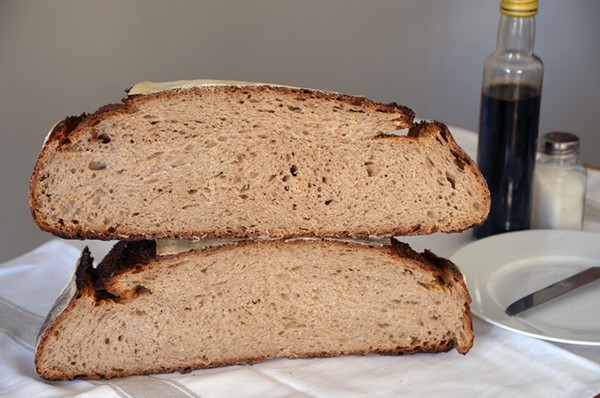Large, rustic country bread
by Ibán Yarza (lamemoriadelpan.com, tequedasacenar.com)
For years now I’ve helped restaurants to make (and improve) their bread. Surprisingly, a restaurant kitchen is not so different to an everyday kitchen in a home, and I think that’s why I feel comfortable making bread in restaurants, because it’s not so far removed from my main area of work, home baking. The needs and requirements of restaurants tend to be more specialised, though. Often in the world of catering the thing they most lack is the time that is so necessary to make good bread, therefore recipes that are quick and give results that are as stunning as they are useful are the order of the day.

Speaking of bread, one of the times when most time and labour is required (and which encourages this type of products) are the various stages of the shaping of the small components: divvying up, weighing, rolling into balls, pre-shaping, proving and the final shaping. Processing 3 kg mass into small 50 g rolls is quite time-intensive: it’s tedious and expensive. However, if that same 3 kg dough is used to make a single piece, the whole process runs a lot more quickly and the result is unbeatable. A 3 kg loaf looks stunning on any table, and as soon as diners enter the room, they spot it on the table and it’s as if they’re suddenly filled with that sense of calm, and unconsciously they think to themselves: “There’s home-made bread, we’re going to eat well here”. Cut off as many slices as you need for a whole service or use for scrumptious sandwiches.
This bread takes after the shape and texture of a large, rustic country-style bread, and mixes wheat and rye to achieve a classic taste and dark crumb. If you don’t have a starter dough already ready, you can substitute for a mix of 350 g of water, 350 g of wheat flour and 1 g of fresh yeast; mix it all together and leave it to proof at room temperature overnight).
Ingredients
- Wholegrain wheat starter dough 700 g (100 % hydrated, as much flour as water)
- Strong flour 750 g
- Wholegrain rye flour 750 g
- Water 900 - 1000 g
- Salt 35 g
Once the starter dough is ready, mix all the ingredients in the planetary mixer bowl, keeping back 100 - 150 g of water to make corrections. We don't want the dough to be too wet. By keeping water back it means that you can make corrections during the kneading.
Control the temperature of your dough by measuring the temperature of the flour, so you know if you have to use tepid or cold water. Try to make the final temperature of the dough around 25 - 26° C.
Mix for 3 minutes on the lowest speed and 4 on the next speed up.
Move the dough to an oiled bowl and leave to proof for 3 hours at about 25° C (fold the dough halfway through, after an hour and a half).
Move the dough to a floured table and gently roll it into a ball. Let it rest for 15 minutes before shaping it into a ball again, this time with a little more intensity, and move it to a bowl lined with a cloth and well sprinkled with flour (for this piece of 3 kg, I usually use a 10 - 11 L bowl). Allow it to proof for 4 hours at 25 - 26°C.
Heat the oven to 250° C (190 - 210° C if using a fan oven); once warm, place the dough on a sheet of baking paper, make four cuts in the top of the bread (forming a square, the typical cut for rustic bread) and slide on to a hot tray in the oven.
Put a tray at the bottom of the oven and pour 400 ml of water into it. Close the door and let it cook with the steam for 30 minutes.
After the first 30 minutes, remove the tray of water, lower the temperature to 190 - 200° C (160° C with fan) and cook for at least another hour (until the middle of the loaf reaches 95° C and the crust is thick, toasted and crunchy as in the photo).
Due to the size and baking process, this bread is long-lasting; it is essential you leave it to rest before opening (never open it hot).
